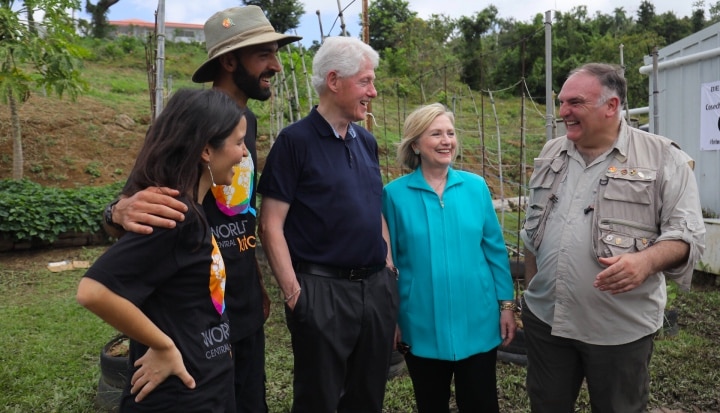How do we empower communities – especially those furthest behind – to have a chance to succeed, improve their lives, and build a better future?
There are several answers to the question – create economic opportunity, improve public health, and inspire civic engagement and service. These are the core elements that drive the work we do at the Clinton Foundation. But there’s one piece that pulls all these elements together, and that we believe is fundamental to solving the challenges we face in our world today: working together in partnerships of purpose.
The Clinton Global Initiative (CGI) is one of the platforms for partnership that the Clinton Foundation is using to create lasting, impactful change around the world. Following the devastating 2017 hurricane season, local leaders from Puerto Rico, the U.S. Virgin Islands, Dominica, and Antigua and Barbuda approached President Clinton to help them build back better. In response, the Clinton Foundation launched the CGI Action Network on Post-Disaster Recovery.
CGI convenes leaders from across sectors to turn ideas into action through a unique action orientated model. Rather than directly implementing projects, CGI enables action by helping members connect, collaborate, and develop Commitments to Action, which are new, specific, and measurable plans that address global challenges.
Each commitment includes a detailed project plan that outlines clear and measurable objectives, a timeline and budget, and key steps required to achieve success. Commitments can be small or large, financial or resource-driven, and philanthropic or core business-related. Many commitments leverage new resources through cross-sector partnerships, with commitment-makers working together to expand their impact.
From the launch of the CGI Action Network on Post-Disaster Recovery to date, 57 commitments have been announced. They cover a range of issues, like the work by Americares to support the mental health of communities who have had their homes and possession ripped away by storms, and the Solar Foundation, Direct Relief International, and the Hispanic Federation who are installing solar and energy storage systems, keeping the lights on so that health services continue to be available even if the main power-grid goes down.
Chef José Andrés is one of the many leaders who is championing the model of CGI through a commitment made by his non-profit, World Central Kitchen. In the Clinton Foundation’s Impact Magazine, Putting People First, Chef Andrés shared his thoughts on why it’s so important for members of the private-sector to join forces with non-profits. You can read more about his work at clintonfoundatoin.org/peoplefirst.
This June, the Action Network will convene its fourth meeting – continuing the discussion around building back better, and how we can support local leaders to realize a more resilient and prosperous future for this important region. It’s a future that – thanks to the support of partners from all sectors and the resilience of communities in the region – looks bright. But, the work of foundations, non-profits, and municipalities can’t be sustained without active engagement and investment by the private sector.
Partnership is key. Businesses are vital members of the communities where they operate. We know their role is more than making a profit. We need the private sector to sustain recovery efforts, but we recognize that for them to do so there must be a win-win: building resiliency for greater prosperity. And, it’s more than corporate social responsibility or making a financial contribution – the development community needs the private sector’s core business expertise to strengthen our capacity.
The need for partnership is all the more acute in the Caribbean, which is on the front lines of climate change. This region will produce – out of necessity – some of the most innovative ideas on how to adapt and protect cities and entire regions against future storms and extreme weather. Economic diversification will help drive a prosperous future and underscore entrepreneurship. CGI is supporting this effort with a number of commitments being led by businesses and non-profits including vocational training and capacity building, food security and agriculture, and small business growth.
When communities are healthy and resilient, businesses are healthy and resilient. And so, we continue to work with and empower our private sector partners to take an active role and continue to support our collective efforts to build back better.
For more information on the Clinton Foundation, and how you can engage with the CGI Action Network on Post-Disaster Recovery, please contact Gregory Milne and visit https://www.clintonfoundation.org/clinton-global-initiative/.










